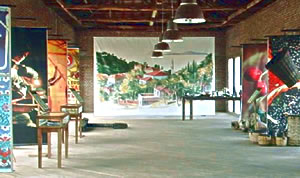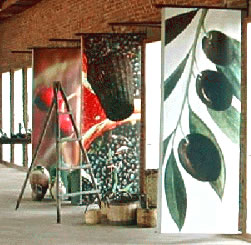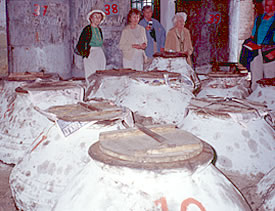


Olive oil culture is so deeply rooted in the history of the eastern Mediterranean that it is mentioned in almost all sacred books. While cultivation and production date back to pre-historic times in Turkey, much of the olive’s history is being forgotten in modern times even though demand in Europe and North America has made olive oil more popular than ever.
Opened in mid-2001, Adatepe Olive Oil Museum, www.adatepe.com, located near the Cankkale-Izmir state highway in Kucukkuyu, is Turkey’s first and only museum dedicated to preserving the literary and visual history of olive oil production in Turkey, historically known as Anatolia. It is a labor of love for its owners who work with local olive farmers to continue the traditional cold-press methods of production using the museum’s working oil extraction factory and storage facility for families in the area.

Upper Gallery,Adatepe Olive Oil Museum.
The museum itself is a restored antique soap factory re-designed to display various precious artifacts related to olive culture, collected from the local villagers. Those fortunate visitors who stop by the museum in late autumn and winter months will be amazed at the very simple procedure of olive oil extraction by the traditional methods.
On the extensive factory grounds, one can see large and small objects impressively displayed, such as: huge granite stone mills for grinding the olives, olive presses belonging to different periods of history, numerous tools for pruning and olive picking as well as carrying baskets and earthenware jars for olive oil storage. There are also amphoras from sunken ships of early Mediterranean trade, the huge oven and the bowl for soap making, knives and stamps for handmade pure olive oil soaps, olive oil lamps, and various labels of the local producers.
Text, maps and pictures in the museum display the progress of the olive by months from the soil to the table, the spread of olives from the Middle East to Europe throughout history, related verses or writings in The Old and the New Testament of the Jewish and Christian faiths as well as in the Islamic Koran. Objects displayed in the museum have explanations both in the local and English languages.
Visitors enjoy tasting freshly baked village bread dipped into equally fresh ‘extra virgin olive oil’. They may also witness the demonstration of pure olive oil soap making, take home some samples of both olive oil and soap from the gift shop, and enjoy some refreshments at the museum’s café.

Traditional olive baskets and picking ladder on display.
The Adatepe Olive Oil Museum is a fine example of Turkey’s developing ‘agri-tourism’. Open seven days a week, it is an attractive stop for the increasingly popular gastronomy tours covering the North-East Aegean region of Turkey. The entrance is free of charge. The Adatepe website tells more about this historic area and its olive oil culture.

A community olive oil ‘bank’ stores dozens of jars of olive oil containing the harvest of individual family orchards.
![]() Click on image below to enjoy an ElderTreks Cultural Tour of Turkey
Click on image below to enjoy an ElderTreks Cultural Tour of Turkey
Click on image below to share a Balloon Ride in Cappadocia
Click on image below to learn about carpet buying in Turkey
Click on image below photo to visit Istanbul, Queen of Cities
